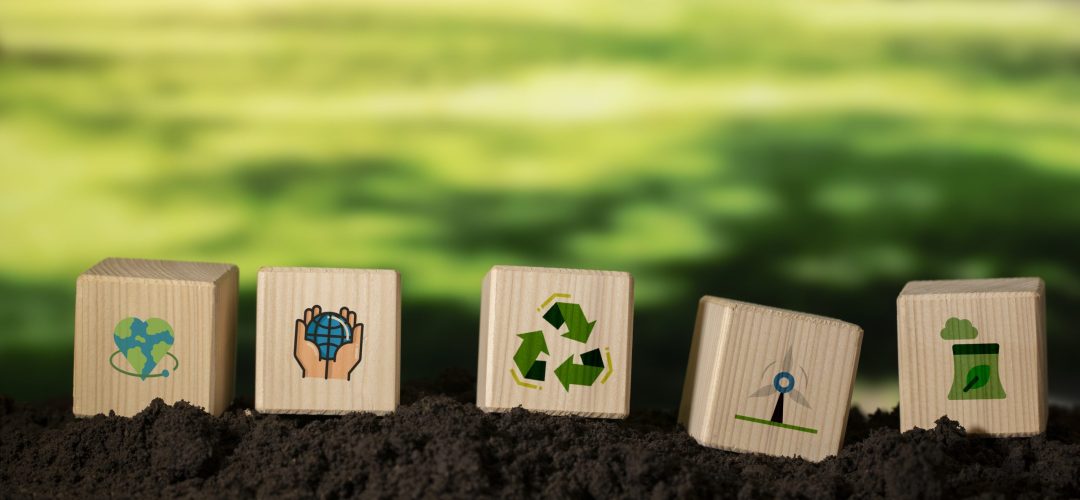Sustainability and Environmental Science

The Sustainability and Environmental Science program offers a comprehensive exploration of the intricate relationship between human society and the natural world. This course delves into the principles of sustainability, ecological systems, climate change, resource management, and environmental policies. Through a blend of theoretical knowledge and practical application, students develop a deep understanding of environmental challenges and innovative solutions. The curriculum incorporates hands-on fieldwork, laboratory experiments, and data analysis to equip students with skills in environmental assessment and conservation. Graduates of this program are empowered to critically analyze complex environmental issues, propose sustainable strategies, and contribute to the global efforts of preserving the planet for current and future generations.
Our Sustainability and Environmental Science qualifications have been designed in collaboration with colleges, higher education institutions, and sector skills councils. They offer a pathway for individuals to progress to university degrees and cover Diploma Level- 3 to 7.
These qualifications provide the flexibility for learners to choose from a variety of optional units at each level. This allows them to specialize in specific areas while also gaining the essential core knowledge necessary for all managers.
- Establish a strong groundwork in fundamental mathematics, physics, and scientific principles relevant to sustainability and environmental science.
- Comprehend the tenets behind conceiving, evaluating, and constructing sustainable environmental systems, encompassing ecosystems, renewable energy systems, pollution mitigation, and waste management.
- Acquire insight into environmental science concepts, with a particular emphasis on crafting ecologically sound strategies for water and air quality enhancement, waste reduction, and ecological restoration.
- Explore the intricacies of structural analysis and design principles, encompassing the behavior of diverse materials and their applications in eco-friendly architecture and landscape restoration.
- Develop proficiencies in environmental surveying, geospatial analysis, and sustainable project management, essential for orchestrating environmentally conscious endeavors.
- Master the application of contemporary scientific tools, software, and technologies for data interpretation, simulation, and modeling within the realm of sustainability and environmental science.
- Apprehend the ecological repercussions of scientific undertakings, investigating avenues for harmonizing sustainable practices with resilient ecosystem development.
- Cultivate analytical thinking, innovative issue resolution, and collaborative competencies through hands-on assignments, experimental investigations, and ecological design initiatives.
Upon successful completion of the Electrical and Electronics Engineering program, graduates are presented with a diverse range of career options across various sectors. Potential career paths include electrical engineer, electronics engineer, power engineer, telecommunications engineer, control systems engineer, instrumentation engineer, renewable energy engineer, embedded systems engineer, robotics engineer, and more.
Graduates can explore employment opportunities in engineering firms, private agencies, consulting companies, telecommunications companies, power generation and distribution companies, manufacturing companies, research institutions, and technology companies. They may also choose to pursue advanced studies at the graduate level or work in academia and research.
Course Details

Level 3- National Diploma in Sustainability and Environmental Science
Course Overview:
The Level 3- National Diploma in Sustainability and Environmental Science is designed to provide students with a foundational understanding of key concepts in sustainability and environmental science. This diploma offers an introductory exploration of principles and practices related to ecological balance, resource conservation, and environmental management. Students will gain insights into the challenges facing our planet and the role of science in finding sustainable solutions. The course aims to foster an appreciation for the interconnectedness of human activities and the natural world.
Equivalences:
The Level 3- National Diploma in Sustainability and Environmental Science is equivalent to an A-level qualification and holds recognition from various educational and professional institutions. This qualification serves as a stepping stone for individuals aspiring to further their education or start their careers in sustainability and environmental science.
Course Contents:
The course content of the Level 3- National Diploma in Sustainability and Environmental Science typically covers a range of advanced topics. Subjects included are:
- Introduction to Sustainability and Environmental Science
- Principles of Ecology and Ecosystem Dynamics
- Renewable Energy and Sustainable Practices
- Pollution Control and Environmental Health
- Biodiversity Conservation and Restoration
- Climate Change and Adaptation Strategies
- Resource Management and Waste Reduction
- Sustainable Development and Global Environmental Challenges
Assignment Criteria:
The qualification assessment criteria are based on assignments, but in order to pass, the learner must complete all of the unit’s learning requirements. At the completion of each unit, an interview will be held as proof that the work truly belongs to the learner.
Entry Requirements:
The specific entry requirements for the Level 3- National Diploma in Sustainability and Environmental Science may include:
- Minimum age requirements (usually 16 years or older).
- Completion of O-level/ 10th Standard or equivalent qualifications.
- Completion of a relevant Level 2 qualification in Sustainability and Environmental Science or a related subject.
- Basic understanding of science and environmental concepts.
- English language proficiency, demonstrated through language tests or previous education in an English-speaking environment.
Course Duration:
The qualification has recommended course duration of 1 year.
Note: However the course duration may be increased to meet additional learning needs if required.
Level 4- Extended Diploma in Sustainability and Environmental Science
Course Overview:
The Level 4- Extended Diploma in Sustainability and Environmental Science provides students with an in-depth exploration of the intricate relationship between human activities and the environment. This diploma delves into advanced concepts in sustainability, ecological conservation, and environmental management. Students will gain a comprehensive understanding of the challenges posed by climate change, resource depletion, and pollution, as well as the strategies to mitigate these issues. The course emphasizes the application of scientific knowledge to address complex global environmental problems.
Equivalences:
The Level 4- Extended Diploma in Sustainability and Environmental Science is recognized as equivalent to the first year of an undergraduate degree and holds acknowledgment from various educational and professional institutions. This qualification serves as a crucial platform for those looking to deepen their knowledge in sustainability and environmental science or pursue related higher education.
Course Contents:
The course content of the Level 4- Extended Diploma in Sustainability and Environmental Science typically covers a range of advanced topics. Some of the key subjects included are:
- Advanced Ecological Concepts and Biodiversity Conservation
- Sustainable Energy Systems and Renewable Technologies
- Environmental Pollution and Remediation Strategies
- Climate Change Science and Mitigation Strategies
- Environmental Impact Assessment and Sustainability Indicators
- Resource Economics and Sustainable Management
- Environmental Policy and International Agreements
- Sustainable Land Use and Urban Planning
- Water Resource Management and Conservation
- Research Methods in Sustainability and Environmental Science
Assignment Criteria:
The qualification assessment criteria are based on assignments, but in order to pass, the learner must complete all of the unit’s learning requirements. At the completion of each unit, an interview will be held as proof that the work truly belongs to the learner.
Entry Requirements:
The specific entry requirements for the Level 4- Extended Diploma in Sustainability and Environmental Science may include:
- Minimum age requirements (usually 18 years or older).
- Completion of A-level/ 12th Standard or equivalent qualifications.
- Completion of a Level 3 qualification in Sustainability and Environmental Science or a related field may be required by some institutions.
- Sound understanding of foundational sustainability and environmental science concepts.
- English language proficiency, demonstrated through language tests or previous education in an English-speaking environment.
Course Duration:
The qualification has recommended course duration of 1 year.
Note: However the course duration may be increased to meet additional learning needs if required.
Level 5- Higher National Diploma in Sustainability and Environmental Science
Course Overview:
The Level 5- Higher National Diploma in Sustainability and Environmental Science is a comprehensive program designed to equip students with advanced knowledge and skills in tackling complex environmental challenges. This diploma delves into cutting-edge concepts and practices in sustainability, ecological restoration, and environmental policy. Students will explore innovative strategies for sustainable resource management, climate adaptation, and global environmental governance. The course emphasizes critical analysis, research-based decision-making, and leadership skills crucial for driving impactful change in the realm of environmental sustainability.
Equivalences:
The Level 5- Higher National Diploma in Sustainability and Environmental Science is equivalent to the second year of an undergraduate degree and is recognized by esteemed educational and professional institutions. This qualification is tailored for individuals seeking to enhance their expertise in sustainability and environmental science, whether to advance their careers or pursue higher education.
Course Contents:
The course content of the Level 5- Higher National Diploma in Sustainability and Environmental Science typically covers a range of advanced topics. Here are the topics covered:
- Advanced Ecological Restoration and Ecosystem Services
- Sustainable Resource Management and Circular Economy
- Environmental Impact Assessment and Sustainable Development Goals
- Climate Adaptation Strategies and Resilience Planning
- Environmental Law and Policy Analysis
- Biodiversity Conservation and Habitat Management
- Sustainable Agriculture and Food Systems
- Energy Transition and Low-Carbon Technologies
- Water Security and Watershed Management
- Advanced Research Methods in Sustainability and Environmental Science
Assignment Criteria:
The qualification assessment criteria are based on assignments, but in order to pass, the learner must complete all of the unit’s learning requirements. At the completion of each unit, an interview will be held as proof that the work truly belongs to the learner.
Entry Requirements:
The specific entry requirements for the Level 5- Higher National Diploma in Sustainability and Environmental Science may include:
- Minimum age requirements (usually 18 years or older).
- A year 1 Bachelor’s Degree, Successful completion of a Level 4 qualification in Sustainability and Environmental Science or a related field.
- A deep understanding of advanced sustainability and environmental science concepts.
- English language proficiency, demonstrated through language tests or previous education in an English-speaking environment.
Course Duration:
The qualification has recommended course duration of 18 Months.
Note: However the course duration may be increased to meet additional learning needs if required.
Level 6- International Diploma in Sustainability and Environmental
Course Overview:
The Level 6- International Diploma in Sustainability and Environmental Science is an advanced program designed for individuals aspiring to lead transformative initiatives in environmental sustainability. This diploma delves into intricate aspects of sustainability, environmental management, and policy formulation. Students will explore emerging trends in renewable energy, ecosystem restoration, and sustainable urban planning. The course emphasizes critical analysis, research, and strategic thinking required for spearheading sustainable solutions in a rapidly changing world.
Equivalences:
The Level 6- International Diploma in Sustainability and Environmental Science is recognized as equivalent to the final year of an undergraduate degree and is respected by educational and professional institutions. This qualification is designed for individuals aiming to excel as sustainability professionals, environmental consultants, researchers, or further their education in related fields.
Course Contents:
The course content of the Level 6- International Diploma in Sustainability and Environmental Science typically covers a range of advanced topics. Here are the topics covered:
- Advanced Environmental Policy and Governance
- Sustainable Urban Planning and Smart Cities
- Climate Resilience and Adaptation Strategies
- Ecological Economics and Green Business Practices
- Conservation Biology and Habitat Restoration
- Environmental Impact Assessment and Sustainable Development
- Renewable Energy Systems and Green Technologies
- Waste Management and Circular Economy
- Water Resource Management and Watershed Restoration
- Biodiversity Monitoring and Management
- Environmental Justice and Social Equity
- Dissertation or Major Research Project in Sustainability and Environmental Science
Assignment Criteria:
The qualification assessment criteria are based on assignments, but in order to pass, the learner must complete all of the unit’s learning requirements. At the completion of each unit, an interview will be held as proof that the work truly belongs to the learner.
Entry Requirements:
The course content of the Level 6- International Diploma in Sustainability and Environmental Science may include:
- Minimum age requirements (usually 20 years or older).
- A year 2 of bachelor’s degree, A Level 5 Diploma or equivalent qualification in Sustainability and Environmental Science or a related field.
- Profound understanding of advanced sustainability and environmental science principles and practices
- English language proficiency, demonstrated through language tests or previous education in an English-speaking environment.
- In case of no formal university education, learners can gain entry on the basis of work experience. Learners having 3 years of work experience or more are eligible in case of no formal educational qualification.
Course Duration:
The qualification has recommended course duration of 18 Months.
Note: However the course duration may be increased to meet additional learning needs if required.
Level 7- Post Graduate Diploma in Sustainability and Environmental Science
Course Overview:
The Level 7- Post Graduate Diploma in Sustainability and Environmental Science is an esteemed program designed for accomplished professionals and scholars aiming to lead transformative change in the field of environmental sustainability. This diploma delves into advanced and multidisciplinary concepts, equipping students with the knowledge and skills to address complex global environmental challenges. The course emphasizes critical analysis, policy formulation, innovative research, and strategic leadership in sustainable practices. Graduates of this program are poised to drive sustainability initiatives, influence policy decisions, and advance the understanding of environmental stewardship on a global scale.
Equivalences:
The Level 7- Post Graduate Diploma in Sustainability and Environmental Science is equivalent to a Master’s degree and is recognized by distinguished educational and professional institutions. This qualification is ideal for individuals seeking to make a profound impact as sustainability leaders, environmental consultants, researchers, educators, or pioneers in sustainable technologies.
Course Contents:
The course content of the Level 7- Post Graduate Diploma in Sustainability and Environmental Science typically covers a range of advanced topics. Here are the topics covered:
- Advanced Environmental Policy and Global Governance
- Sustainable Urban Development and Resilient Infrastructure
- Climate Change Mitigation and Carbon Management
- Ecosystem Restoration and Biodiversity Conservation
- Advanced Ecological Economics and Green Finance
- Renewable Energy Innovations and Technological Advancements
- Sustainable Land Use Planning and Landscape Design
- Environmental Impact Assessment and Sustainable Development Strategies
- Social Equity and Environmental Justice
- Sustainable Consumption and Lifestyle Choices
- Advanced Research Methods in Sustainability and Environmental Science
- Dissertation or Major Research Project in Sustainability and Environmental Science
- Environmental Ethics and Ecological Responsibility
- Corporate Sustainability and Stakeholder Engagement
- International Environmental Law and Policy
Assignment Criteria:
The qualification assessment criteria are based on assignments, but in order to pass, the learner must complete all of the unit’s learning requirements. At the completion of each unit, an interview will be held as proof that the work truly belongs to the learner.
Entry Requirements:
The specific entry requirements for the Level 7- Post Graduate Diploma in Sustainability and Environmental Science may include:
- Learners must be 22 years or older at the beginning of the course.
- A complete Bachelor’s degree, UK level 6 diploma in Sustainability and Environmental Science or an equivalent overseas qualification.
- An advanced understanding of sustainability and environmental science principles and substantial experience in the field.
- English language proficiency, demonstrated through language tests or previous education in an English-speaking environment.
Course Duration:
The qualification has recommended course duration of 2 years.
Note: However the course duration may be increased to meet additional learning needs if required.

